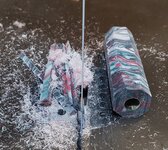I am wondering . . . If the fact that a pen is small . . and that seems to say - it can be done in a few minutes or at least an hour - that pushes those new to turning to try and get a pen done before they fully (or even partially) understand the basics? Tony's post above made me think of that.
I am not a person that naturally "practices" things, but after about 3 or 4 pens, I knew I didn't know how to turn right, how to sand right, how to apply CA correctly, how to use the different tools correctly or just how sharp was needed. I cut a two foot long piece of pine 2X4 into pen sized blanks and practiced Drilling, putting tubes in, turning and getting the feel of the tool, and the feel of how it cut, practice sanding (which its different than on flat work that I knew well) and practice with CA application and sanding. I probably spent about 6 or 7 hours practicing the steps that one day.
I did not have a TonyL kind of person to help me, but I sure wish I had. I don't think there was a wood late within 50 miles of me when I started. But it was the practice, practice practice. A pen was not my goal; learning the steps and feel WAS. Even after I had a hundred or so wood blanks under my belt, I started turning a few acrylics. I destroyed a couple of inexpensive ones and then decided to learn to cast. With my cheap cast acrylic (don't remember which kind exactly as the kind was written in Japanese ) and I practiced on 3 or 4 of those to get the feel. That helped immensely.
My 9th grade Typing instructor in 1962 taught us: When you start something new that you don't know how to do, do a step at a time and repeat, repeat, repeat. Sure helped in learning how to turn pens. Kinda like the Karate Kid, Wax on, Wax off. It really helps when you don't have someone like Tony to help. Thanks Tony for what you do!

